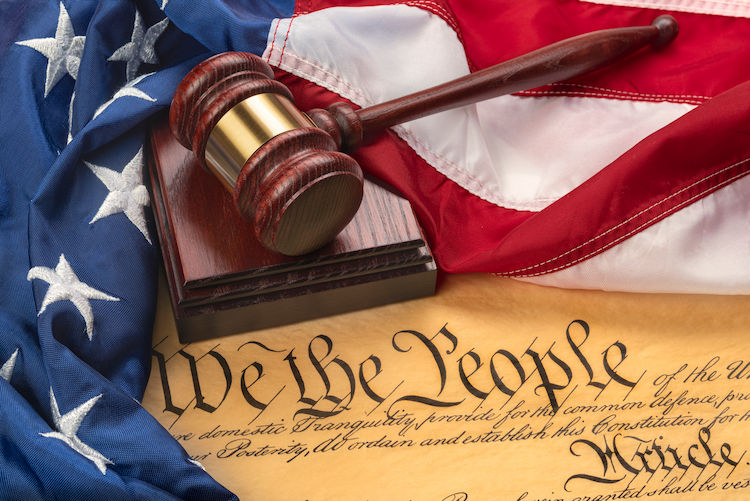Menu
Hot-Topics
February 19, 2026 | SCOTUS Reaffirms Fourth Amendment Standard for Police Responding to Household Emergencies
Category: Current

SCOTUS Upholds Preliminary Injunction Against Title IX Rule Granting Protections to LBGTQ Students
In Department of Education v. Louisiana, the U.S. Supreme Court refused to lift preliminary injunctions preventing the Department of Education from implementing a new rule that broadens the definition of sex-based discrimination under Title IX of th...

SCOTUS Remands Content Moderation Cases But Still Delivers First Amendment Lessons
In Moody v. NetChoice and NetChoice v. Paxton, 603 U.S. ____ (2024), the U.S. Supreme Court confirmed that social-media platforms have First Amendment interests in exercising editorial discretion over the third-party content. However, the Court rem...

Unanimous Supreme Court Rejects First Amendment Challenge to Lanham Act’s Name Clause
In Vidal v. Elster, 602 U.S. ____ (2024), the U.S. Supreme Court held that the names clause of Lanham Act, which prohibits the registration of a mark that consists of a name identifying a particular living individual without their consent, does not...

Presidential Immunity Under Trump v. United States
In Trump v. United States, 603 U.S. ____ (2024), the U.S. Supreme Court held that a former President is entitled to absolute immunity from criminal prosecution for actions within his conclusive and preclusive constitutional authority. It further fou...

SCOTUS Clarifies Bruen in Upholding Federal Gun Law
In United States v. Rahimi, 602 U.S. ____ (2024), the U.S. Supreme Court upheld a federal law that prohibits individuals subject to a domestic violence restraining order from possessing a gun. According to the Court, when an individual has been fou...

Supreme Court Upholds Homeless Ordinance Imposing Criminal Penalties
In City of Grants Pass, Oregon v. Johnson, 603 U.S. ____ (2024), the U.S. Supreme Court upheld a city ordinance that imposes criminal penalties on homeless sleeping outside. According to the Court, the enforcement of generally applicable laws regula...

Divided Supreme Court Strikes Down Chevron in Landmark Decision
Reversing four decades of precedent, the U.S. Supreme Court struck down the Chevron doctrine in its recent decision in Relentless v. Department of Commerce and Loper Bright Enterprises v. Raimondo. By a vote of 6-3, the Court held that Administra...

Supreme Court Rules Bribery Statute Doesn’t Criminalize Gratuities for Past Acts
In Snyder v. United States, 603 U.S. ____ (2024), the U.S. Supreme Court held that 18 U.S.C. §666, a federal law that makes it a crime for state and local officials to “corruptly” solicit, accept, or agree to accept “anything of value from an...

SCOTUS Clarifies Court Must Resolve Competing Arbitration Provisions
In Coinbase, Inc. v. Suski, 602 U.S. ____ (2024), the U.S. Supreme Court held that where parties have agreed to two contracts — one sending arbitrability disputes to arbitration, and the other either explicitly or implicitly sending arbitrability ...

SCOTUS Sides With NRA in First Amendment Dispute
In National Rifle Association of America v. Vullo, 602 U.S. ____ (2024), the U.S. Supreme Court ruled that the National Rifle Association (NRA) may continue its First Amendment lawsuit against the former head of New York’s Department of Financial ...
Previous Articles
SCOTUS Decision in Bowe v. United States Is First of the 2026 Term
by DONALD SCARINCI on February 5, 2026
In Bowe v. United States, 607 U.S. ___ (2026), the U.S. Supreme Court held that Title 28 U.S.C. § ...
SCOTUS Rules State Can’t Immunize Parties from Federal Civil Liability
by DONALD SCARINCI on January 29, 2026
In John Doe v. Dynamic Physical Therapy, LLC, 607 U.S. ____ (2025) the U.S. Supreme Court held that...
Supreme Court to Address Racial Discrimination in Jury Selection
by DONALD SCARINCI onWhile the U.S. Supreme Court has concluded oral arguments for the year, it continues to add cases t...
The Amendments
-
Amendment1
- Establishment ClauseFree Exercise Clause
- Freedom of Speech
- Freedoms of Press
- Freedom of Assembly, and Petitition
-
Amendment2
- The Right to Bear Arms
-
Amendment4
- Unreasonable Searches and Seizures
-
Amendment5
- Due Process
- Eminent Domain
- Rights of Criminal Defendants
Preamble to the Bill of Rights
Congress of the United States begun and held at the City of New-York, on Wednesday the fourth of March, one thousand seven hundred and eighty nine.
THE Conventions of a number of the States, having at the time of their adopting the Constitution, expressed a desire, in order to prevent misconstruction or abuse of its powers, that further declaratory and restrictive clauses should be added: And as extending the ground of public confidence in the Government, will best ensure the beneficent ends of its institution.
Awards





